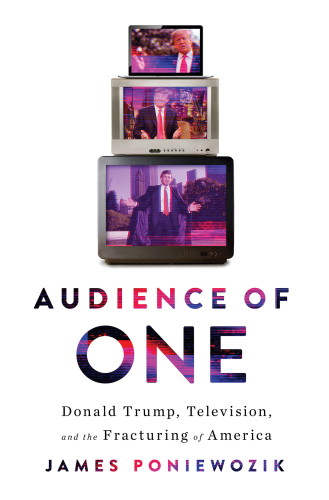
Audience of One
Donald Trump, Television, and the Fracturing of America
کتاب های مرتبط
- اطلاعات
- نقد و بررسی
- دیدگاه کاربران
نقد و بررسی

April 1, 2019
Chief television critic of the New York Times, Poniewozik looks at the history of media and particularly TV to understand where we are today politically. His dual story line combines an understanding of how television grew from a monotone mass media giant to a fractured, refractory kingdom of extreme ideas and insults, even as Trump reinvents himself from gazillionaire business mogul to reality TV star to Twitter-mad, divisive president.
Copyright 2019 Library Journal, LLC Used with permission.

Starred review from June 24, 2019
Epochal shifts in entertainment media have driven the derangement of American politics, according to this caustic, scintillating cultural history. New York Times television critic Poniewozik sets Donald Trump’s political rise against American television’s evolution, from a three-network monopoly broadcasting inoffensive, common denominator fare to a fragmented cable and internet spectrum of isolated niche channels, a world where liberals watched Mad Men while conservatives watched Duck Dynasty. That polarization, he argues, bred new televisual genres that incubated the Trumpian worldview: antihero dramas where ugly violence is needed to defeat even darker forces, reality shows where life is a cutthroat, zero-sum struggle between amoral operators, and cable news shows that portray the world as a chaos of noisy, flashy dogfights where perceptions of truth are dictated by tribal allegiance. Meanwhile, Trump’s own media persona—“the blunt, impolite apex predator” on The Apprentice, the trash-talking bully in pro-wrestling cameos, the birther conspiracy theorist on Fox News guest spots—shaped his political style and then subsumed him entirely: Trump became “a cable news channel in human form: loud, short of attention span, and addicted to conflict,” Poniewozik writes. “TV became president.” Poniewozik’s trenchant, brilliantly witty critique of the cultural archetypes percolating into American politics is one of the best analyses yet of the Trump era.

Starred review from July 15, 2019
The chief TV critic of the New York Times sums it up: "Without TV, there's no Trump." In his stellar debut, Poniewozik demonstrates how Trump, over a period of four decades, "achieved symbiosis" with the TV medium: "Its impulses were his impulses; its appetites were his appetites; its mentality was his mentality." As TV evolved from America's homogenizer (the three major networks) to fragmenter (cable TV), Trump "used the dominant media of the day--tabloids, talk shows, reality TV, cable news, Twitter--to enlarge himself, to become a brand, a star, a demagogue, and a president." Recounting how Trump, who was born in 1946, grew up with TV, the author details how he cultivated a famous image and leveraged celebrity, becoming a reality TV star in the 2000s and a politician in the 2010s. "Playing 'Donald Trump' became his full-time job." His telling analyses of Trump's appearances on The Apprentice, Fox & Friends, and The Howard Stern Show will come as revelations to readers unfamiliar with those programs, on which Trump emerged as an antihero, known for "being real" rather than honest, in the manner of the not "conventionally likeable" people on reality TV. As Poniewozik writes, he "spent a lifetime in symbiosis with television, adopting its metabolism, learning to feed its appetites." For Trump, cable TV news, with its "constant fear and passion" and need to "agitate their viewers, not settle them," was a perfect fit. His daily tweeting is based on careful study of his most popular tweets--those provoking "shock, insult, rage." The author chronicles Trump's actions against a deeply insightful history of vast changes in the media and popular culture during the period. TV, he writes, proved "the perfect medium for his sensibility, for picking fights, for whipping up people's hatred and fear and resentment, for taking the express lane around logic." This intelligent eye-opener belongs on the small shelf of valuable books that help explain how Trump created his base.
COPYRIGHT(2019) Kirkus Reviews, ALL RIGHTS RESERVED.

July 1, 2019
Chief television critic for the New York Times, Poniewozik traces Donald Trump's rise through not only the current president's relationship with television, but also the American people's connection to TV. He bookends the story with one of Trump's first television appearances, on The Today Show with Tom Brokaw in 1980, and his 2016 election. When television only had a handful of networks, it was of utmost importance that programming had broad appeal; execs looked for the Least Objectionable Program. But as television fractured (more channels, cable, streaming), so did audiences, and programming could become niche. Poniewozik argues that this marks the rise of the antihero, a trend that maybe started with Archie Bunker but was solidified with Tony Soprano and Walter White. It also coincides with the onslaught of reality TV, including The Apprentice: Trump had found his home and his audience. This is both a fascinating look at the ways television has changed and shaped the U.S., and a compelling lens through which to look at how we got to November 8, 2016.(Reprinted with permission of Booklist, copyright 2019, American Library Association.)

























دیدگاه کاربران